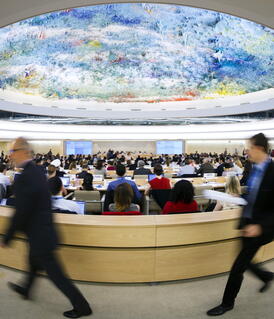How does Germany provide humanitarian assistance?

How are human rights and humanitarian assistance enshrined in German policymaking?
The office of the Commissioner for Human Rights Human rights The respect and strengthening of human rights worldwide are a cornerstone of German Federal Government policy. Together with its EU partners it is committed to protecting and continually advancing human rights standards throughout the world. This occurs in close collaboration with the institutions… Read more › Policy and Humanitarian Assistance has been part of the Federal Foreign Office since 1998. The commissioners are the primary point of contact for matters of human rights Human rights The respect and strengthening of human rights worldwide are a cornerstone of German Federal Government policy. Together with its EU partners it is committed to protecting and continually advancing human rights standards throughout the world. This occurs in close collaboration with the institutions… Read more › protection. They are active internationally as members of EU and OSCE OSCE With its 57 member states, the Organization for Security and Co-Operation in Europe (OSCE) is a comprehensive forum for cooperation at the pan-European level. OSCE missions are active above all in conflict prevention and management. Germany makes a substantial contribution to finance and man-power… Read more › committees, the Council of Europe and the United Nations United Nations The United Nations (UN) has a key role to play in the international system. Germany has been a UN member since 1973. Since joining, Germany has taken on more and more responsibility and is now one of the largest donors and supporters of the United Nations. For example, Germany is the second largest… Read more › (UN). They also hold an important position when it comes to involving civil society organisations and groups in human rights policy. Internally their role is as independent advisors, supporting relevant processes across the whole Federal Government Federal Government The Federal Government and cabinet is made up of the Federal Chancellor and the Federal Ministers. While the Chancellor holds the power to issue directives, the ministers have departmental powers, meaning that they independently run their respective ministries in the framework of those directives… Read more › .
At a parliamentary level, German human rights policy has been supported and overseen - likewise since 1998 - by the Committee for Human Rights and Humanitarian Assistance of the German Bundestag. The German Institute for Human Rights was established in Berlin Berlin Once a year, during the Berlinale film festival, the world of the silver screen focuses its attention on Berlin. And the city’s inhabitants are used to global interest. After all, the people of Berlin have lived in a capital city since 1458. However, there is also a shady side to the city’s history… Read more › in 2001 as a state-funded but still independent office. Its role as the national human rights institution is to contribute to promoting and protecting human rights in Germany and abroad in accordance with the Paris Principles of the United Nations.
How does Germany help people in dire need?
The Federal Government Federal Government The Federal Government and cabinet is made up of the Federal Chancellor and the Federal Ministers. While the Chancellor holds the power to issue directives, the ministers have departmental powers, meaning that they independently run their respective ministries in the framework of those directives… Read more › provides humanitarian assistance to support people around the world who are in distress due to natural disasters, armed conflicts or other crises or conflicts, and who are consequently at specific risk. Aid is provided regardless of the cause of the hardship. Humanitarian assistance is an expression of ethical responsibility and a sign of solidarity with those in need. It is targeted at the needs of those in distress and is based on the humanitarian principles of benevolence, neutrality, impartiality and independence.
Around the world, Germany takes responsibility for those in need and is an active campaigner for a stronger and better developed international humanitarian system. This can be seen from Germany’s actual financial commitment – the Federal Republic is the world’s second largest state donor of humanitarian aid. The Federal Government made a total of 2.25 billion euros available in 2024, working closely with the various aid organisations of the United Nations United Nations The United Nations (UN) has a key role to play in the international system. Germany has been a UN member since 1973. Since joining, Germany has taken on more and more responsibility and is now one of the largest donors and supporters of the United Nations. For example, Germany is the second largest… Read more › (UN) in particular. The Federal Government is also campaigning to make the system of humanitarian assistance more efficient and effective.
Besides the UN organisations, key partners are the International Red Cross and Red Crescent movements and other NGOs. Support is provided above all for activities in the areas of food security, health, mine and explosive ordnance clearance, water supply and sanitation, accommodation, protection and disaster prevention. Many projects address several of these areas simultaneously.
Through the Federal Foreign Office Strategy for Humanitarian Assistance Abroad that it published in September 2024, Germany’s aim is to make its engagement effective and efficient, even under difficult conditions. Despite growing challenges and declining resources, Germany remains a central actor in international aid.


